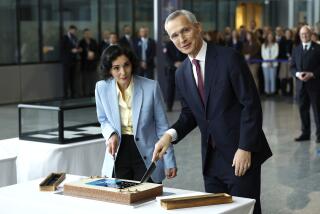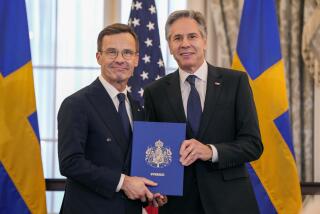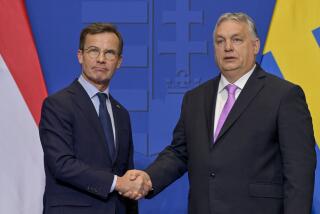No More ‘Svejking’ for Soldiers
- Share via
After a tumultuous history of being betrayed by allies and shackled by imperial powers, the Czech Republic has joined NATO. As its new partner, the alliance is welcoming an army plagued by aged Soviet equipment, archaic command structures, neglected barracks and extremely low morale. But in doing so, NATO also is inheriting an army with a tortured history of incompetence and disloyalty.
For the last half century, the Czech army ostensibly stood as the Soviet Union’s first line of defense in the event of a war against NATO. However, rather than repelling the threat of Western capitalism, in 1989 Czechoslovakia became one of the first Soviet satellites to officially renounce communism. The Czech army was more of a liability to the Soviets than an asset. Among Soviet commanders, Czech soldiers earned a bad reputation and became a source of derision on the home front.
In fact, throughout the 20th century, the Czech army earned a dubious reputation for idleness. During World War I, Czech and Slovak troops fighting under the Austro-Hungarian Empire deserted en masse to the Allies. Czechs were helpless when Nazi Germany annexed Bohemia after Munich. The army did not act after a communist coup sealed Czechoslovakia behind the iron curtain in 1948. But perhaps most notoriously, the Czech army remained confined to its barracks as Soviet tanks led a Warsaw Pact invasion to crush the Prague Spring of 1968.
To be fair, there have been several heroic exceptions to the disreputable tradition of the do-nothing Czech army. During the World War I and World War II, thousands of Czech volunteers fought valiantly in exiled armies for the independence of their homeland. Czechoslovak airmen played an important role in defending the skies over England during the Battle of Britain and Czech agents pulled off one of the most daring and notorious missions of World War II--assassinating Reinhardt Heydrich, Himmler’s deputy in the SS.
So the Czechs have proved that they can be competent, loyal and brave when fighting for democracy and their country. How then did such a formidable fighting force decline into the whipping boy of the Warsaw Pact?
Czechs will argue that they merely played the role of the slacker in order to exact their own particular form of revenge upon their foreign masters. Resentful of Soviet oppression, Czech soldiers made poor defenders of the communist ethic and the Eastern bloc. “There was no sense of patriotism,” one former soldier explained. “This was not the army of our country, Czechoslovakia, but the army of the Socialist State of Czechoslovakia.”
To resist communism, many servicemen took as their model the Good Soldier Svejk, a fictional character created by Czech author Jaroslav Hasek. It may be unnerving to learn that Svejk (pronounced sh-vake), considered to be the Czech national hero, happens to be a patent imbecile. Through his own trademark incompetence and doublespeak, the lowly Svejk subverts the Austrian war effort, despite obediently following orders. The reader understands that Svejk’s idiocy is merely a reflection of the nonsense that surrounded him.
“Svejk” has entered the Czech lexicon as a verb meaning to undermine the system through intentional acts of stupidity. At no other time was “svejking” more prevalent, and more appropriate, than under the repressive communist regime. The totality of Soviet control left the Czechs with few other outlets for protest.
Rather than directly confront the overwhelming might of their occupiers in vain, tiny Czechoslovakia slowly chipped away at the monstrous regimes through small acts of subversion. Soldiers were expected not to think, so how could their officers be surprised when they acted like idiots? Their svejking ruined the Czechoslovak army.
Joining NATO, on the other hand, represents a free choice by the Czech people. With NATO membership, the Czech Republic has finally broken free from Moscow’s reins and can allowed take its long-awaited place in Europe. It will be aligned with the democratic states of the Euro-American axis and firmly entrenched where it has always longed to be: in Western Europe. According to Czech President Vaclav Havel, joining NATO is an important step in this process. He declared that by accepting the Czech Republic as a member, NATO has recognized that Czechs share and will defend “Euro-American values .”
Mindful of their turbulent history, Czechs are nevertheless aware that a new era has arrived. Czech soldiers can finally stop svejking their duties and begin defending a state, a set of values, a position in Europe that they can call their own.
More to Read
Sign up for Essential California
The most important California stories and recommendations in your inbox every morning.
You may occasionally receive promotional content from the Los Angeles Times.













